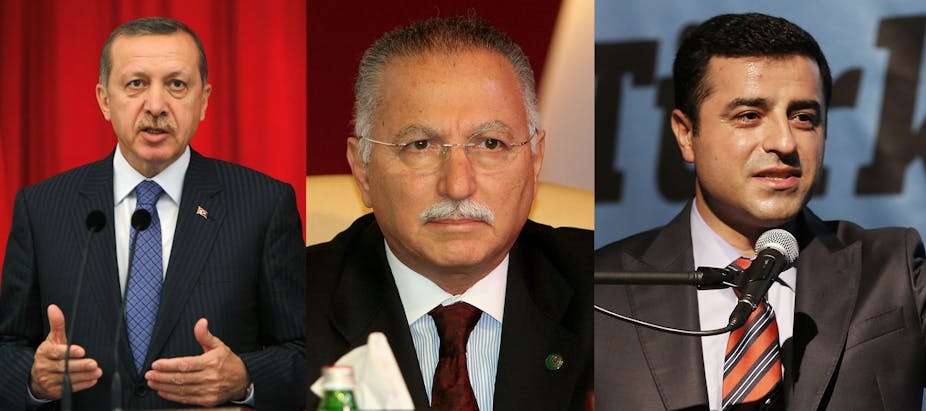Turkey awaits a fateful election on August 10. The electorate will be heading back to the polls to elect, for the first time in the country’s Republican history, the president by popular vote. If no candidate receives more than 50% of the vote in the first round, a second round of voting will take place on August 24.
The candidates
In the wake of the local elections that took place on March 30, the top contender for the job is current prime minister, Recep Tayyip Erdoğan. He’s been the country’s prime minister since 2003 and is the favourite to become president.
There are two other candidates. Turkey’s two main opposition parties, the centre-left CHP (Republican People’s Party) and the nationalist MHP (Nationalist Movement Party) chose to go with a joint candidate, Ekmeleddin İhsanoğlu. An academic and the founder of the History of Science Department at Istanbul University, İhsanoğlu most recently served as the Secretary General of the Organisation of Islamic Cooperation.
The small, mainly Kurdish affiliated HDP (People’s Democracy Party) field a prominent, dynamic Kurdish politician, Selahattin Demirtaş. Demirtaş ran an effective campaign and proved to be a humorous, attractive candidate who may succeed in widening the base of his party beyond ethnic Kurds and small leftist groups.
There are serious differences as to how the candidates define the job. Erdoğan wishes to transform the presidency from a mainly ceremonial post of a parliamentary system to an executive one. This certainly goes against Turkey’s current constitution and political tradition where most executive powers rest in the prime ministry.
Unless Erdoğan, who has little patience for checks and balances on his use of power, gets the constitutional change he wants after the general elections set for 2015, he will either manage to find a clone to assume the post of the prime minister or there will be clashes between the two offices if the next prime minister fully assumes the power and the authority of his office. Both Professor İhsanoğlu and Demirtaş prefer to keep the presidency in the confines of its current constitutional definition.
The campaigns
Whatever the outcome and whether the election will be finalised in the first round or the second, there is no doubt that the campaign has been conducted under unfair and unequal conditions. The prime minister has exploited to the full the advantages of his office and travelled widely around the country enjoying full coverage from a largely subservient broadcast media, a large segment of which is positively partisan. The media in general and the public stations in particular gave scandalously unequal coverage to the candidates.
The public had no chance to listen to a debate between the candidates to understand what their platforms were, since the prime minister refused to appear with the others in front of national audiences. Plus, the financing of the campaign was less than transparent and many business people had good reason to fear retaliation if their support went to the wrong candidate. To beef up the atmosphere of intimidation that already dominated the country, the long-awaited prosecution and persecution of the Hizmet movement was launched just two weeks before the election.
Most polls indicate that Erdoğan is within reach of winning in the first round with a comfortable margin. If not, he may have to negotiate with the Kurdish nationalist party, since their voters (usually around 6 to 7% of the vote) would have the power to decide the second round.
The results
An Erdoğan presidency will change the course of Turkey’s politics. Unless former President Gül assumes the leadership of the ruling AKP and thereby makes it possible for the party to dampen Erdoğan’s ambitions, the presidency will increasingly become the centre of executive power. An extraordinarily skillful, ruthless and widely popular politician, Erdogan has already obliterated Turkey’s meek system of checks and balances. His record over the past three years nearly rendered the judiciary (save for the Constitutional Court) an extension of the executive and he has established a profound state of intimidation throughout the country.
Without any countervailing or restraining power, Erdoğan as president will take Turkey further down the road of electoral authoritarianism. This new authoritarianism will have an Islamic lexicon and it will try to redefine the institutions of the regime based on Islamic rather than secular principles.
This will be part of its novelty and will go against the grain of 200 years of Turkey’s history of Westernised modernisation, long-resented by the country’s Islamists. The tragic dimension of this election therefore is that most of the voters seem unaware of how fateful the election is for the future course, stability and cohesion of the country.

